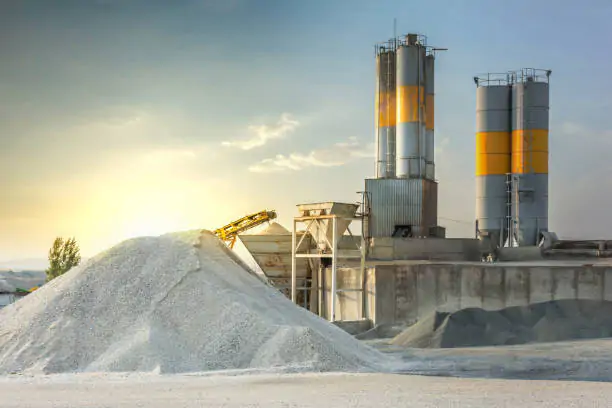How are ATEX Corrosion Resistant Fans Used in Cement and Asphalt Production?
As with many process industries, corrosion resistant ATEX fans are used in the production stages of cement and asphalt manufacturing. The industrial fan, alongside other system components, ensures safety, increases plant efficiency, and in terms of combustion, helps to maximise product yield to meet the required demand placed on the manufacturer from a busy and competitive industry.
The processes involved in the manufacture of cement and asphalt lead to the production of flammable fumes and vapours, or combustible dust particles which can accumulate in the air. Ventilation systems are relied upon to maintain a safe and comfortable working environment for operators as well as reducing a build-up of gases or dusts that could create a potential for explosion given the right conditions.
Accurate fan selection is required for applications handling potentially explosive or combustible materials. In line with the ATEX guidelines for explosive atmospheres, an ATEX certified fan must be constructed in a manner that reduces its risk of becoming a source of ignition. It’s a delicate and intensive topic that constantly evolves, and as a result the directive places a huge emphasis on not making decisions on ATEX ratings lightly. If you’re interested in learning more about ATEX fan construction, see here. Another key factor is that the fan adheres to the correct ATEX zone requirements. This is dependent on each production plant and therefore a DSEAR analysis would determine the components safety zone. Learn more about ATEX zones here.


Corrosion of fans and other components is a significant problem in the cement and asphalt industry due to the aggressive nature of the corrosive fumes and vapours present. Our corrosion resistant ATEX fans manufactured from a non-corrosive carbon loaded polypropylene polymer, are suitable for gas zone 1, gas zone 2 and dust zone 22. Carbon loaded ATEX fans are designed specifically to dissipate static electricity to reduce the risk of sparks and friction associated with static discharge.
Explosion Proof Fans for Cement Production Processes
To initiate the process of cement manufacturing, raw materials such as limestone, sand and clay are extracted and sent to the cement plant where they are crushed and milled into fine powders. The powders are combined and then sent through two kilns, where it is first preheated to burn off impurities and then travels through an extremely elevated temperature kiln where the CO2 is removed from the limestone and the powders are converted into a solid product referred to as clinker. Explosion proof fans can operate safely in these zones and provide efficient cooling through the kilns, preventing overheating to extreme temperatures which could cause damage to components.
The clinker, otherwise referred to as ‘Raw Meal,’ is then transported by air supply from material handling fans, along with any gases, to the next stage of the process where it is then ground to a fine powder and cooled in a tube or ball mill. Fans integrated for cooling are required at this stage to blow air into the cooler. This significantly reduces the temperature of the product before it can be conveyed for packaging and dispatch. Ineffective cooling fans can lead to inadequate quality product and damage to conveyor systems.
ATEX Rated Fans for Asphalt Production Processes
Asphalt cement contains a mixture of asphalt, aggregates such as gravel, sand, and crushed rocks and bitumen, a binder that holds the aggregates together. At the first stage of asphalt production the aggregates need drying as quickly as possible in a drying burner. ATEX fans are required to provide a consistent and reliable airflow into the burner to enhance the temperature of the boiler and speed up the drying process. The aggregates are then mixed with hot bitumen which is stored in preheated tanks to maintain temperature.
Another major problem that needs to be controlled with cement and asphalt production is air pollution. ATEX exhaust fans, integrated into dust collector systems, work to capture fine dust and toxic air particles through a set of filters to reduce emissions into atmosphere.
To discuss any industrial fan detail, contact one of our fan integration specialists on 01782 349 430 or reach out via our live web chat.